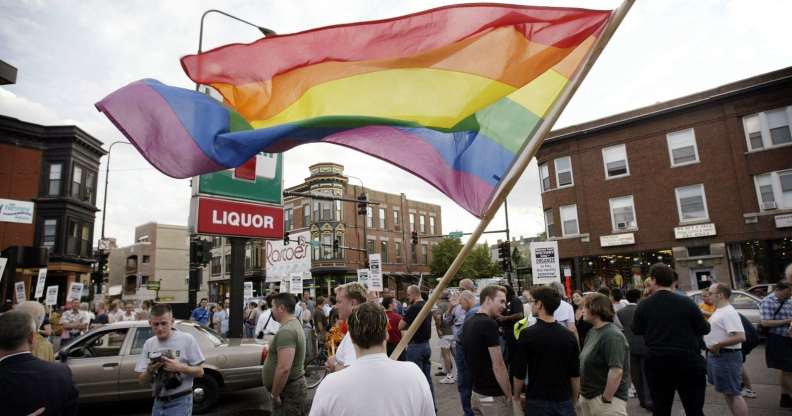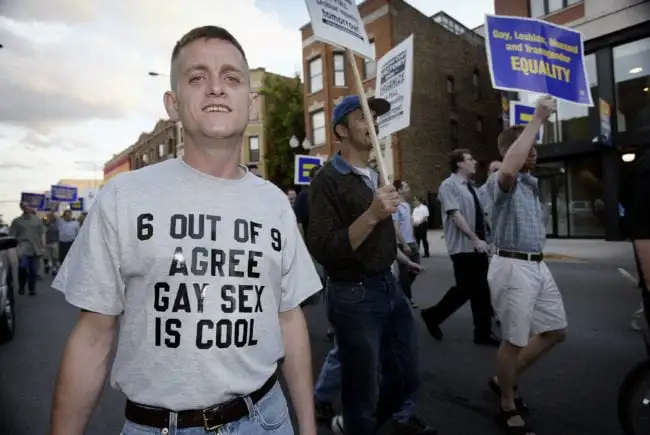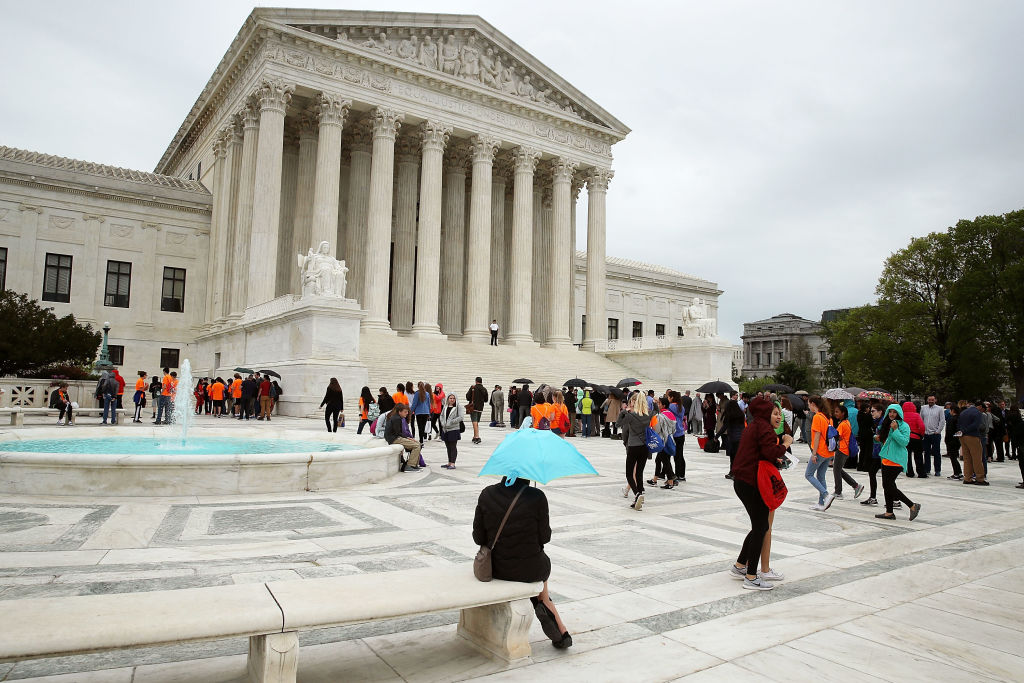Gay sex has been legal in Texas for 15 years today

Supporters of the United States Supreme Court ruling striking down a Texas anti-sodomy law (Scott Olson/Getty)
Today marks 15 years since gay sex was decriminalised in Texas and a string of other US states.
On June 26 2003, the US Supreme Court ruled that state-level sodomy laws banning gay sex were illegal.
The 6-3 ruling in Lawrence V Texas struck down laws banning gay sex in fourteen states – Texas, Kansas, Oklahoma and Missouri Alabama, Florida, Idaho, Louisiana, Mississippi, North Carolina, South Carolina, Michigan, Utah and Virginia.
Several of the states have still not repealed the defunct sodomy laws that remain on their statute books but are unenforceable.

Two men walk hand in hand on June 26, 2003 after a landmark decision to overturn a Texas law making sodomy illegal. (Justin Sullivan/Getty)
In the case, gay 55-year-old John Geddes Lawrence Jr had challenged an attempt to prosecute him for having consensual gay sex with another man.
Attorneys for Texas battled the attempts to invalidate the state sodomy law, which criminalised “”engaging in deviate sexual intercourse with another individual of the same sex”.
The states of Alabama, South Carolina, and Utah filed a brief warning that gay sex has “severe physical, emotional, psychological, and spiritual consequences”, while several prominent conservative groups also called for sodomy laws to be maintained.
Republican-linked lobbying groups including the Family Research Council and Liberty Counsel, who continue to make prominent interventions against LGBT rights to this day, filed briefs in the case insisting that gay sex must remain criminalised.
The Liberty Counsel wrote: “It is the right and duty of states to regulate conduct deemed harmful to society.
“Prohibiting behaviour deemed unacceptable or immoral is precisely what law does: it limits one’s freedom to act in ways that cause harm to the individual or to society.
“States are justified in enforcing a societal morality as a means of self-preservation because ‘social bonds constituted by shared moral beliefs are placed in peril when the law tolerates actions that are generally considered to be wicked.'”

Stacy Bridges marches in support of the United States Supreme Court ruling striking down a Texas anti-sodomy law June 26, 2003 (Scott Olson/Getty)
The court ultimately ruled that sodomy laws are an unconstitutional violation of due process rights.
The decision was supported by six justices – Justices Anthony Kennedy, John Paul Stevens, David Souter, Ruth Bader Ginsburg, Stephen Breyer, and Sandra Day O’Connor.
Then-Chief Justice William H. Rehnquist dissented against the ruling along with justices Antonin Scalia and Clarence Thomas.
In his dissent, Justice Scalia made openly homophobic comments, writing: “Today’s opinion is the product of a court, which is the product of a law-profession culture, that has largely signed on to the so-called homosexual agenda.”

(Getty)
He added: “Many Americans do not want persons who openly engage in homosexual conduct as partners in their business, as scoutmasters for their children, as teachers in their children’s schools, or as boarders in their home.”
Today is also the anniversary of several other prominent US Supreme Court rulings on LGBT rights, all of which were issued on June 2016.
June 26, 2013 was the date the Supreme Court issued a ruling in United States v. Windsor striking down parts of the US-wide Defence of Marriage Act (DOMA) that banned federal recognition of same-sex marriages.
Exactly two years later, on June 26, 2015, the Supreme Court ruled in Obergefell v. Hodges that gay couples had a constitutional right to marry in – exactly 12 years to the day after sodomy laws were struck down.
DNC Chair Tom Perez said: “Before the Supreme Court handed down its decision in U.S. v. Windsor five years ago, Edie Windsor said, ‘I think justice will prevail. Is that crazy?’ Because of her indomitable spirit and the activism of millions of LGBTQ Americans, justice did prevail. Love is love. And America is better for it.
“All across the country, LGBTQ Americans and their allies have organized for equal rights and brought our nation closer to fulfilling its promise of equality for all people – no matter who they are or who they love.
“Today’s anniversaries remind us that while it may not happen overnight, progress is possible. As long as people raise their voices for what’s right, we can bend the arc of the moral universe toward justice.”
Perez added: “But our fight must continue. LGBTQ Americans still face inequality across our society – from bathrooms and boardrooms to bakeries and the ballot box. Every day, Republicans in Congress, the White House, and at the state and local level are trying to turn back the clock on LGBTQ rights.
“Even though marriage equality is the law of the land, that hasn’t stopped Republicans from trying to demean and delegitimize LGBTQ marriage through discriminatory adoption bills and so-called ‘religious liberty’ laws.
“The Democratic Party stands with LGBTQ communities in America and around the world. We believe that no one should face discrimination, bullying, or violence because of who they are or who they love.
“That’s why we’re working to enact legislation like the Equality Act to protect LGBTQ Americans. We believe in the values of inclusion and opportunity for all, and we will never stop fighting for the equality every human being deserves.”
“The march toward LGBTQ equality has been long and hard-fought — and it’s far from over. But some days, we’re reminded of just how far we’ve come. June 26th is one of those days.”

